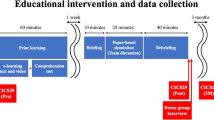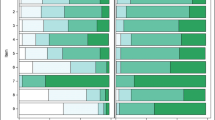Abstract
Introduction
There has been increased recognition of the importance of non-technical skills (e.g., communication and leadership) for cardiac arrest management. However, training is often insufficient to cultivate the requisite level of proficiency of these non-technical skills.
Methods
We evaluated non-technical and technical skills performance of internal medicine residents in simulated cardiac arrest cases prior to and following a novel application of an interactive teaching strategy known as the Jigsaw Method. This method is one of the several established teaching strategies intended to actively engage learners. Internal medicine residents participated in pre- and post-intervention medical knowledge quizzes and cardiac arrest simulation cases. Technical skills (i.e., medical knowledge) were assessed by multiple-choice quizzes and non-technical skills (i.e., leadership, communication) with performance scoring.
Results
Fifty-six residents, including 50 of 53 (94%) matriculated senior residents from within the internal medicine program, participated. There was statistically significant improvement in quiz scores (median 63.3 vs. 80.0, p < .0001) and mock code performance scores (median 58.4 vs. 72.1, p = 0.01), comprising both leadership and communication components.
Conclusions
Application of the Jigsaw Method resulted in improved technical and non-technical cardiac arrest management skills. Our findings support the implementation of this active teaching-learning technique into graduate medical education (GME) for non-technical skills training.

Similar content being viewed by others
References
Andersen PO, Jensen MK, Lippert A, Ostergaard D. Identifying non-technical skills and barriers for improvement of teamwork in cardiac arrest teams. Resuscitation. 2010;81(6):695–702.
Hunziker S, Johansson AC, Tschan F, Semmer NK, Rock L, Howell MD, et al. Teamwork and leadership in cardiopulmonary resuscitation. J Am Coll Cardiol. 2011;57(24):2381–8.
Yeung JH, Ong GJ, Davies RP, Gao F, Perkins GD. Factors affecting team leadership skills and their relationship with quality of cardiopulmonary resuscitation. Crit Care Med. 2012;40(9):2617–21.
Robinson PS, Shall E, Rakhit R. Cardiac arrest leadership: in need of resuscitation? Postgrad Med J. 2016;92(1094):715–20.
Lom B. Classroom activities: simple strategies to incorporate student-centered activities within undergraduate science lectures. J Undergrad Neurosci Educ. 2012;11(1):A64–71.
Gilkar SA, Lone S, Lone RA. Introduction of active learning method in learning physiology by MBBS students. Int J Appl Basic Med Res. 2016;6(3):186–90.
Lloyd-Jones D, Adams RJ, Brown TM, Carnethon M, Dai S, De Simone G, et al. Executive summary: heart disease and stroke statistics—2010 update: a report from the American Heart Association. Circulation. 2010;121(7):948–54.
Wayne DB, Didwania A, Feinglass J, Fudala MJ, Barsuk JH, McGaghie WC. Simulation-based education improves quality of care during cardiac arrest team responses at an academic teaching hospital: a case-control study. Chest. 2008;133(1):56–61.
Acknowledgements
The authors wish to thank Ivan Crnosija, MPH, for the statistical support provided.
Author information
Authors and Affiliations
Corresponding author
Ethics declarations
After formal review by the Stony Brook University Human Subjects Committee Institutional Review Board (IRB), it was deemed that this study did not meet the definition of human subjects’ research (IRB reference no. 2016-3865-F).
Conflict of Interest
The authors declare that they have no conflict of interest.
Electronic Supplementary Material
Online Resource 1
(DOCX 797 kb)
Online Resource 2
(DOCX 35 kb)
Online Resource 3
(DOCX 23 kb)
Online Resource 4
(DOCX 17 kb)
Rights and permissions
About this article
Cite this article
Fryman, C., Fei, A., Mehta, R. et al. Jigsaw Method for Non-technical Skills in Cardiac Arrest: a Novel Application of This Active Learning Pedagogy. Med.Sci.Educ. 28, 401–405 (2018). https://doi.org/10.1007/s40670-018-0566-x
Published:
Issue Date:
DOI: https://doi.org/10.1007/s40670-018-0566-x




